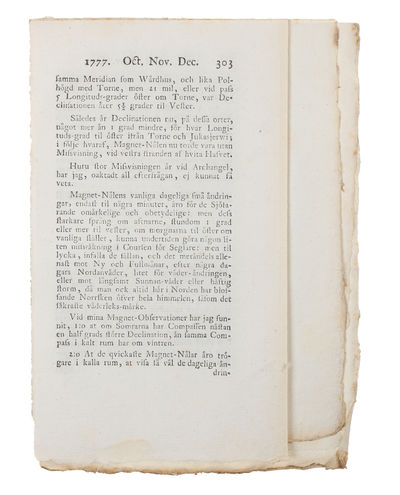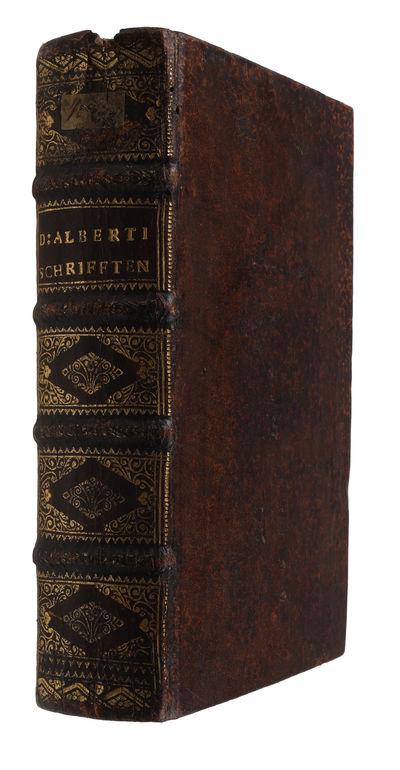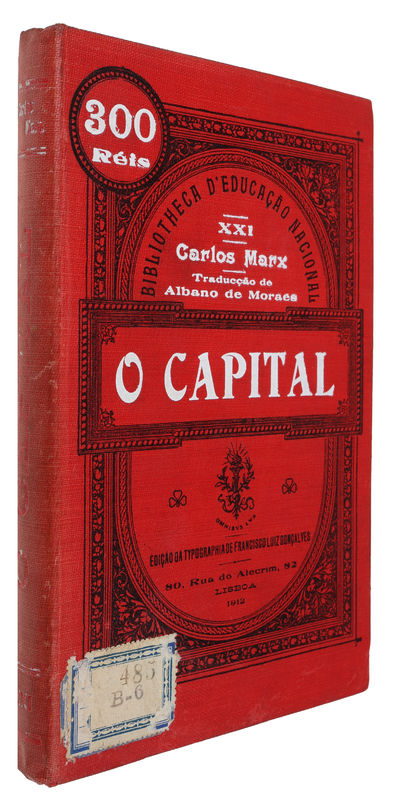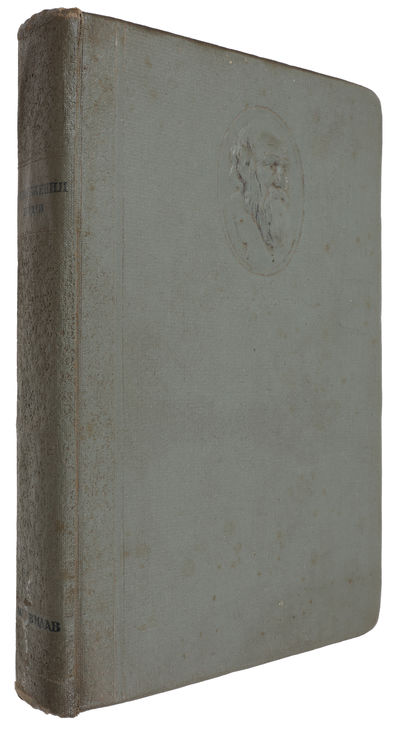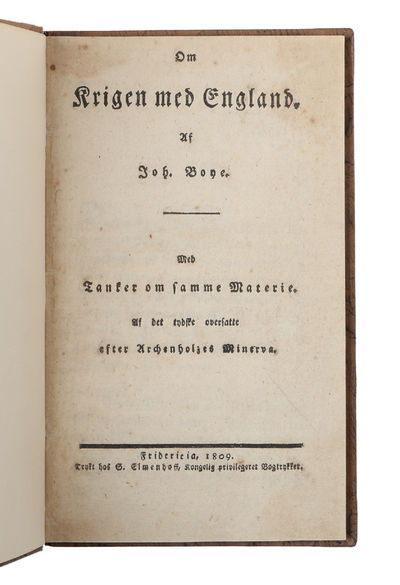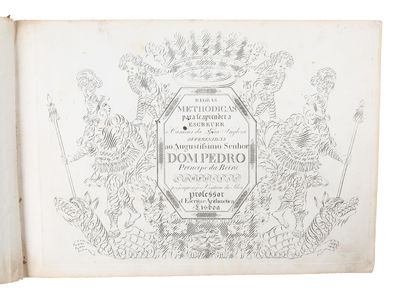LUXEMBURG, ROSA.
Die Akkumulation des Kapitals. Enin Beitrag zur Ökonomischen Erklärung des Imperialismus. [The Accumulation of Capital]. - [THE NEAREST TO "CAPITAL" OF ANY MARXIST WORK]
Herman H. J. Lynge & Søn A/S
lyn56002
Berlin, 1913. Royal 8vo. Uncut and partly unopened in original printed wrappers. Soiling to spine, vaguely affecting first and last leaf. Overall in a very fine condition. (8), 446, (2) pp.
The very rare first edition of Rosa Luxemburg's magnum opus - "without doubt, one of the most original contributions to Marxist economic doctrine since "Capital". In its wealth of knowledge, brilliance of style, trenchancy of analysis and intellectual independence, this book, as Mehring, Marx's biographer, stated, was the nearest to "Capital" of any Marxist work. The central problem it studies is of tremendous theoretical and political importance: namely, what effects the extension of capitalism into new, backward territories has on the internal contradictions rending capitalism and on the stability of the system." (Tony Cliff). Rosa Luxemburg (1871-1919) was one of the most influential Marxists of the late 19th century. In her youth, she joined the socialist movement and went to Switzerland in exile in 1889. Here she studied law and economics and developed close connections to the leading members of the Russian socialist party. As opposed to Lenin, she was in complete favour of internationalism and therefore in opposition to the established Russian and Polish socialist parties that supported Polish independence. In 1893, she co-founded what was to be the forerunner of the Polish Communist Party, namely the Socialdemocratic Labour Party of Poland.In 1899, Rosa Luxemburg settled in Berlin and joined the German Socildemocratic Party, SPD and represented the revolutionary wing. She believed strongly in revolutionary mass action, but as opposed to Lenin, she was not completely bound to the revolutionary party and spoke out against movements like the reform union in Germany. "Rosa Luxemburg was born in the small Polish town of Zamosc on 5 March 1871. From early youth she was active in the socialist movement. She joined a revolutionary party called Proletariat, founded in 1882, some 21 years before the Russian Social Democratic Party (Bolsheviks and Mensheviks) came into being. From the beginning Proletariat was, in principles and programme, many steps ahead of the revolutionary movement in Russia. While the Russian revolutionary movement was still restricted to acts of individual terrorism carried out by a few heroic intellectuals, Proletariat was organising and leading thousands of workers on strike. In 1886, however, Proletariat was practically decapitated by the execution of four of its leaders, the imprisonment of 23 others for long terms of hard labour, and the banishment of about 200 more. Only small circles were saved from the wreck, and it was one of these that Rosa Luxemburg joined at the age of 16. By 1889 the police had caught up with her, and she had to leave Poland, her comrades thinking she could do more useful work abroad than in prison. She went to Switzerland, to Zurich, which was the most important centre of Polish and Russian emigration. There she entered the university where she studied natural sciences, mathematics and economics. She took an active part in the local labour movement and in the intense intellectual life of the revolutionary emigrants.Hardly more than a couple of years later Rosa Luxemburg was already recognised as the theoretical leader of the revolutionary socialist party of Poland. She became the main contributor to the party paper, Sprawa Rabotnicza, published in Paris. In 1894 the name of the party, Proletariat, was changed to become the Social Democratic Party of the Kingdom of Poland; shortly afterwards Lithuania was added to the title. Rosa continued to be the theoretical leader of the party (the SDKPL) till the end of her life.In August 1893 she represented the party at the Congress of the Socialist International. There, a young woman of 22, she had to contend with well-known veterans of another Polish party, the Polish Socialist Party (PPS), whose main plank was the independence of Poland and which claimed the recognition of all the experienced elders of international socialism. Support for the national movement in Poland had the weight of long tradition behind it: Marx and Engels, too, had made it an important plank in their policies. Undaunted by all this, Rosa Luxemburg struck out at the PPS, accusing it of clear nationalistic tendencies and a proneness to diverting the workers from the path of class struggle; and she dared to take a different position to the old masters and oppose the slogan of independence for Poland. (For elaboration on this, see Rosa Luxemburg and the national question below.) Her adversaries heaped abuse on her, some of them, like the veteran disciple and friend of Marx and Engels, Wilhelm Liebknecht, going so far as to accuse her of being an agent of the Tsarist secret police. But she stuck to her point.Intellectually she grew by leaps and bounds. She was drawn irresistibly to the centre of the international labour movement, Germany, where she made her way in 1898." (Tony Cliff, Rosa Luxemburg Biography).In 1919, she was captured and murdered by reactionary freetroop officers, but her theoretical works remained highly influential throughout almost a century. As late as the 1960'ies and 70'ies, she was still seen as somewhat of a revolutionary hero and champion of communism. "When the First World War broke out, practically all the leaders of the Socialist Party [SPD] were swept into the patriotic tide. On 3 August 1914 the parliamentary group of German Social Democracy decided to vote in favour of war credits for the Kaiser’s government. Of the 111 deputies only 15 showed any desire to vote against. However, after their request for permission to do so had been rejected, they submitted to party discipline, and on 4 August the whole Social Democratic group unanimously voted in favour of the credits. A few months later, on 2 December, Karl Liebknecht flouted party discipline to vote with his conscience. His was the sole vote against war credits.This decision of the party leadership was a cruel blow to Rosa Luxemburg. However, she did not give way to despair. On the same day, 4 August, on which the Social Democratic deputies rallied to the Kaiser’s banner, a small group of socialists met in her apartment and decided to take up the struggle against the war. This group, led by Luxemburg, Karl Liebknecht, Franz Mehring and Clara Zetkin, ultimately became the Spartakus League. For four years, mainly from prison, Rosa continued to lead, inspire and organise the revolutionaries, keeping high the banner of international socialism...The revolution in Russia of February 1917 was a realisation of Rosa Luxemburg’s policy of revolutionary opposition to the war and struggle for the overthrow of imperialist governments. Feverishly she followed the events from prison, studying them closely in order to draw lessons for the future. Unhesitatingly she stated that the February victory was not the end of the struggle but only its beginning, that only workers’ power could assure peace. From prison she issued call after call to the German workers and soldiers to emulate their Russian brethren, overthrow the Junkers and capitalists and thus, while serving the Russian Revolution, at the same time prevent themselves from bleeding to death under the ruins of capitalist barbarism.When the October Revolution broke out, Rosa Luxemburg welcomed it enthusiastically, praising it in the highest terms. At the same time she did not believe that uncritical acceptance of everything the Bolsheviks did would be of service to the labour movement. She clearly foresaw that if the Russian Revolution remained in isolation a number of distortions would cripple its development; and quite early in the development of Soviet Russia she pointed out such distortions, particularly on the question of democracy.On 8 November 1918 the German Revolution freed Rosa Luxemburg from prison. With all her energy and enthusiasm she threw herself into the revolution. Unfortunately the forces of reaction were strong. Right-wing Social Democratic leaders and generals of the old Kaiser’s army joined forces to suppress the revolutionary working class. Thousands of workers were murdered; on 15 January 1919 Karl Liebknecht was killed; on the same day a soldier’s rifle butt smashed into Rosa Luxemburg’s skull.With her death the international workers’ movement lost one of its noblest souls. "The finest brain amongst the scientific successors of Marx and Engels", as Mehring said, was no more. In her life, as in her death, she gave everything for the liberation of humanity." (Tony Cliff, Biography of Rosa Luxemburg).Sraffa 3560Social Liberation 4066
The very rare first edition of Rosa Luxemburg's magnum opus - "without doubt, one of the most original contributions to Marxist economic doctrine since "Capital". In its wealth of knowledge, brilliance of style, trenchancy of analysis and intellectual independence, this book, as Mehring, Marx's biographer, stated, was the nearest to "Capital" of any Marxist work. The central problem it studies is of tremendous theoretical and political importance: namely, what effects the extension of capitalism into new, backward territories has on the internal contradictions rending capitalism and on the stability of the system." (Tony Cliff). Rosa Luxemburg (1871-1919) was one of the most influential Marxists of the late 19th century. In her youth, she joined the socialist movement and went to Switzerland in exile in 1889. Here she studied law and economics and developed close connections to the leading members of the Russian socialist party. As opposed to Lenin, she was in complete favour of internationalism and therefore in opposition to the established Russian and Polish socialist parties that supported Polish independence. In 1893, she co-founded what was to be the forerunner of the Polish Communist Party, namely the Socialdemocratic Labour Party of Poland.In 1899, Rosa Luxemburg settled in Berlin and joined the German Socildemocratic Party, SPD and represented the revolutionary wing. She believed strongly in revolutionary mass action, but as opposed to Lenin, she was not completely bound to the revolutionary party and spoke out against movements like the reform union in Germany. "Rosa Luxemburg was born in the small Polish town of Zamosc on 5 March 1871. From early youth she was active in the socialist movement. She joined a revolutionary party called Proletariat, founded in 1882, some 21 years before the Russian Social Democratic Party (Bolsheviks and Mensheviks) came into being. From the beginning Proletariat was, in principles and programme, many steps ahead of the revolutionary movement in Russia. While the Russian revolutionary movement was still restricted to acts of individual terrorism carried out by a few heroic intellectuals, Proletariat was organising and leading thousands of workers on strike. In 1886, however, Proletariat was practically decapitated by the execution of four of its leaders, the imprisonment of 23 others for long terms of hard labour, and the banishment of about 200 more. Only small circles were saved from the wreck, and it was one of these that Rosa Luxemburg joined at the age of 16. By 1889 the police had caught up with her, and she had to leave Poland, her comrades thinking she could do more useful work abroad than in prison. She went to Switzerland, to Zurich, which was the most important centre of Polish and Russian emigration. There she entered the university where she studied natural sciences, mathematics and economics. She took an active part in the local labour movement and in the intense intellectual life of the revolutionary emigrants.Hardly more than a couple of years later Rosa Luxemburg was already recognised as the theoretical leader of the revolutionary socialist party of Poland. She became the main contributor to the party paper, Sprawa Rabotnicza, published in Paris. In 1894 the name of the party, Proletariat, was changed to become the Social Democratic Party of the Kingdom of Poland; shortly afterwards Lithuania was added to the title. Rosa continued to be the theoretical leader of the party (the SDKPL) till the end of her life.In August 1893 she represented the party at the Congress of the Socialist International. There, a young woman of 22, she had to contend with well-known veterans of another Polish party, the Polish Socialist Party (PPS), whose main plank was the independence of Poland and which claimed the recognition of all the experienced elders of international socialism. Support for the national movement in Poland had the weight of long tradition behind it: Marx and Engels, too, had made it an important plank in their policies. Undaunted by all this, Rosa Luxemburg struck out at the PPS, accusing it of clear nationalistic tendencies and a proneness to diverting the workers from the path of class struggle; and she dared to take a different position to the old masters and oppose the slogan of independence for Poland. (For elaboration on this, see Rosa Luxemburg and the national question below.) Her adversaries heaped abuse on her, some of them, like the veteran disciple and friend of Marx and Engels, Wilhelm Liebknecht, going so far as to accuse her of being an agent of the Tsarist secret police. But she stuck to her point.Intellectually she grew by leaps and bounds. She was drawn irresistibly to the centre of the international labour movement, Germany, where she made her way in 1898." (Tony Cliff, Rosa Luxemburg Biography).In 1919, she was captured and murdered by reactionary freetroop officers, but her theoretical works remained highly influential throughout almost a century. As late as the 1960'ies and 70'ies, she was still seen as somewhat of a revolutionary hero and champion of communism. "When the First World War broke out, practically all the leaders of the Socialist Party [SPD] were swept into the patriotic tide. On 3 August 1914 the parliamentary group of German Social Democracy decided to vote in favour of war credits for the Kaiser’s government. Of the 111 deputies only 15 showed any desire to vote against. However, after their request for permission to do so had been rejected, they submitted to party discipline, and on 4 August the whole Social Democratic group unanimously voted in favour of the credits. A few months later, on 2 December, Karl Liebknecht flouted party discipline to vote with his conscience. His was the sole vote against war credits.This decision of the party leadership was a cruel blow to Rosa Luxemburg. However, she did not give way to despair. On the same day, 4 August, on which the Social Democratic deputies rallied to the Kaiser’s banner, a small group of socialists met in her apartment and decided to take up the struggle against the war. This group, led by Luxemburg, Karl Liebknecht, Franz Mehring and Clara Zetkin, ultimately became the Spartakus League. For four years, mainly from prison, Rosa continued to lead, inspire and organise the revolutionaries, keeping high the banner of international socialism...The revolution in Russia of February 1917 was a realisation of Rosa Luxemburg’s policy of revolutionary opposition to the war and struggle for the overthrow of imperialist governments. Feverishly she followed the events from prison, studying them closely in order to draw lessons for the future. Unhesitatingly she stated that the February victory was not the end of the struggle but only its beginning, that only workers’ power could assure peace. From prison she issued call after call to the German workers and soldiers to emulate their Russian brethren, overthrow the Junkers and capitalists and thus, while serving the Russian Revolution, at the same time prevent themselves from bleeding to death under the ruins of capitalist barbarism.When the October Revolution broke out, Rosa Luxemburg welcomed it enthusiastically, praising it in the highest terms. At the same time she did not believe that uncritical acceptance of everything the Bolsheviks did would be of service to the labour movement. She clearly foresaw that if the Russian Revolution remained in isolation a number of distortions would cripple its development; and quite early in the development of Soviet Russia she pointed out such distortions, particularly on the question of democracy.On 8 November 1918 the German Revolution freed Rosa Luxemburg from prison. With all her energy and enthusiasm she threw herself into the revolution. Unfortunately the forces of reaction were strong. Right-wing Social Democratic leaders and generals of the old Kaiser’s army joined forces to suppress the revolutionary working class. Thousands of workers were murdered; on 15 January 1919 Karl Liebknecht was killed; on the same day a soldier’s rifle butt smashed into Rosa Luxemburg’s skull.With her death the international workers’ movement lost one of its noblest souls. "The finest brain amongst the scientific successors of Marx and Engels", as Mehring said, was no more. In her life, as in her death, she gave everything for the liberation of humanity." (Tony Cliff, Biography of Rosa Luxemburg).Sraffa 3560Social Liberation 4066
Adresse:
Silkegade 11
DK-1113 Copenhagen Denmark
Telefon:
CVR/VAT:
DK 16 89 50 16
Email:
Web:
![Die Akkumulation des Kapitals. Enin Beitrag zur Ökonomischen Erklärung des Imperialismus. [The Accumulation of Capital]. - [THE NEAREST TO "CAPITAL" OF ANY MARXIST WORK] (photo 1)](https://d3525k1ryd2155.cloudfront.net/h/693/700/1148700693.0.l.0.jpg)
